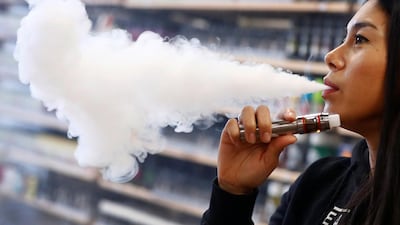E-cigarettes, vaping devices and tobacco refills are to be hit with a 100 per cent tax from January, the UAE Cabinet has said.
The expansion of the 2017 excise tax on tobacco follows the legalisation of the sale of battery-powered smoking devices in mid-April.
Juices and drinks containing added sugar and sweeteners will also be subject to a 50 per cent tax.
In a series of tweets, the UAE Government Communication Office said the move was intended to “reduce consumption of harmful goods, prevent chronic illnesses linked to sugar and tobacco and help consumers make sensible healthy choices”.
The UAE became the latest country to allow the legal sale of e-cigarettes this year. Until then, selling the products to consumers was illegal but owning and smoking them was not and they were widely used in public.
Abdulla Al Maeeni, head of the product standards agency, Esma, at the time said there was concern about the spread of unregulated devices bought online and a “lack of knowledge of the ingredients used”.
Doctors remain divided on the move. Some argue they give problem smokers a much-needed alternative to traditional cigarettes, which are filled with tar and other dangerous chemicals. Critics say they are an attractive way for young people to start smoking.
Since then, tobacco giants have put e-cigarettes on sale.
Philip Morris introduced iQOS in supermarkets across the UAE in July. The battery-powered nicotine delivery devices heat tobacco sticks, rather than burning like cigarettes, to create less harmful toxins when inhaled, it is claimed. They are currently priced from Dh250, but unless the manufacturer absorbs some of the cost, this will increase to about Dh500 when the 100 per cent excise is applied from January.
Replacement tobacco sticks, called Heets, are already taxed under existing excise regulations.
The new levy on sugary drinks will also hit brands that escaped the 50 per cent tax on fizzy drinks that caused the price of Coca-Cola, Red Bull and Pepsi to rise. The government is expected to release a list of taxable products within days.
Read More
UAE to allow sale of e-cigarettes and vaping devices
Sugar-packed drinks turning adolescents into addicts, study reveals
Big Tobacco to sell 'smokeless cigarettes' over the counter after UAE rule change
UAE's 'sin tax' driving smokers towards cheaper brands, though many say they have at least cut down
As The National reported last year, non-fizzy sugared drinks were not covered when the original tax was introduced in 2017. Sports drinks sold in supermarkets were found to contain, on average, 20 grams of sugar per 500ml bottle.
For instance, the non-fizzy drink AriZona Iced Tea contains 65 grams of sugar – about 16 teaspoons – per 680ml can. The average can costs about Dh6, which would rise to Dh9.
It appears likely that cold coffee brands are set to be taxed. Drinks such as Starbucks Bottled Mocha Frappuccino contain 31g of sugar in 270ml, while Nescafe Mocha in a can contains 15.6g of sugar in a 240ml can.
A statement from the Cabinet secretariat said there was a need to “enhance public health and prevent chronic diseases directly linked to sugar and tobacco consumption”.
“A tax of 50 per cent will be levied on any product with added sugar or other sweeteners, whether in form of a beverage, liquid, concentrate, powders, extracts or any product that may be converted into a drink,” it said.
Manufacturers must also clearly label any sugar content.
“A tax of 100 per cent will be also levied on electronic smoking devices, whether or not they contain nicotine or tobacco, as well as the liquids used in electronic smoking devices,” the Cabinet secretariat said.
“The decision aims at reducing the consumption of harmful products that put the health of people and environment at risk.”
Doctors in the UAE echoed the Cabinet’s sentiments, saying they hoped the levy would encourage healthier eating habits.
“In the past decade, people having been increasingly leading unhealthy lifestyles which resulted in increase of diabetes, obesity, lung diseases such as asthma or cancer,” said Dr Alaadin Mustafa, a consultant and head of internal medicine at Al Zahra Hospital in Dubai.
“Increasing taxes on these substances should, hopefully, raise people’s awareness towards the dangers of their overuse.”
He said the tax should also help take some of the pressure off the UAE’s healthcare budget.
“Having more sick people will lead to more leave of absence from work, which negatively impacts the economy,” he said.
“We hope that this move will motivate people to take care of their health which will, in turn, will help in developing the prosperity of the UAE.”


